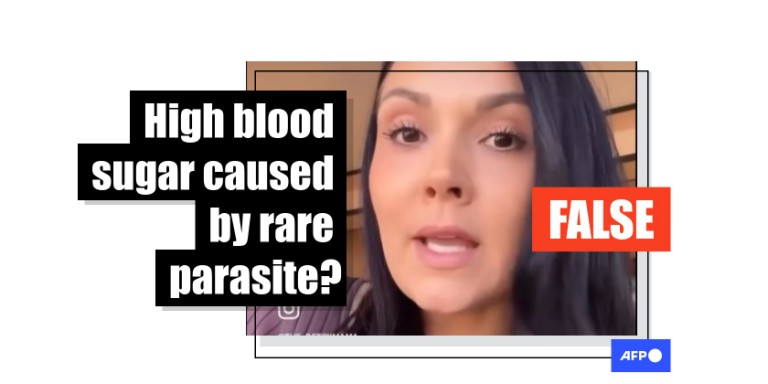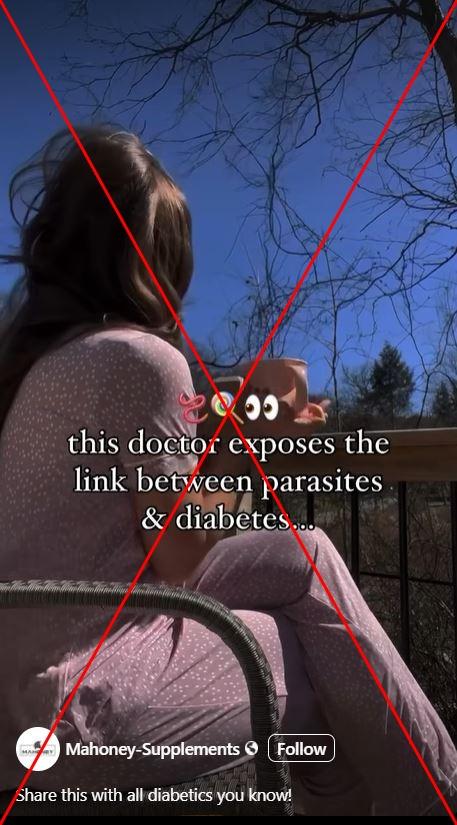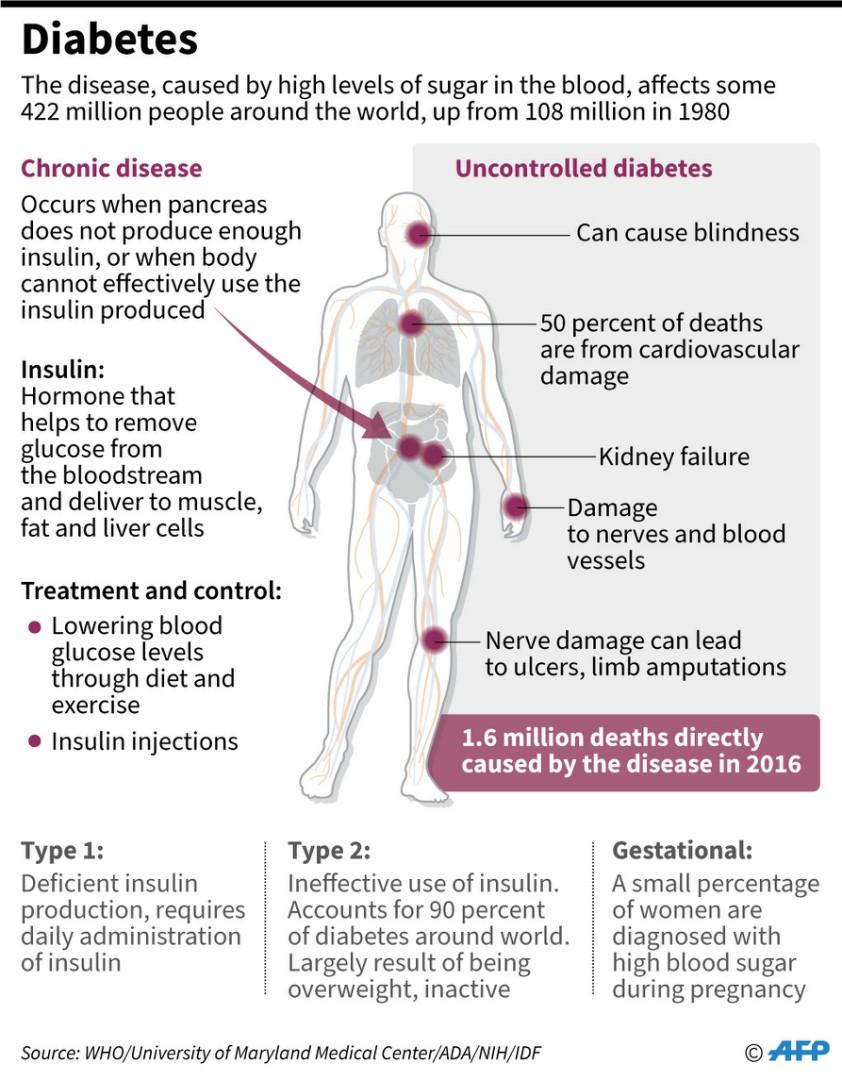
Social media users falsely link diabetes and parasites
- This article is more than one year old.
- Published on December 4, 2024 at 17:42
- 5 min read
- By Daniel Patrick GALGANO, AFP USA
"All diabetics have a common fluke parasite, which is actually the pancreatic fluke of cattle, in their own human pancreas," says a November 22, 2024 Facebook post from a UK-based supplements seller that accumulated almost 30,000 likes.
The video features a 1995 book titled "The Cure for All Diseases," written by Hulda Clark, a scientist who falsely claimed that most diseases, including AIDS, cancer and diabetes, were caused by different parasites and could be cured with an electric "zapper."

The same claim circulated elsewhere on Facebook, Instagram, X, TikTok and Gettr.
Before she died in 2009, Clark said she held a PhD in physiology from the University of Minnesota after studying biology at the University of Saskatchewan. She was not a medical doctor and had no formal education in diabetes treatment, but promoted herself as an alternative medicine practitioner.
US, Canadian and Mexican authorities took action against Clark's "zapper" and other examples of her unproven treatments that she claimed could "cure all diseases" both before and after her death (archived here, here and here). Clark was charged in the US state of Indiana for practicing medicine without a license in 1993, but the case was dismissed in 2000 because prosecutors had not afforded her a speedy trial (archived here).
The US Federal Trade Commission sued Clark's research foundation for making false and misleading claims about the effects of the "zapper" devices. In 2004, District Court Judge John R. Adams barred the foundation and its leadership from claiming Clark's treatments could cure medical conditions, including diabetes (archived here).
Unrelated parasites
In her book, Clark claimed all diabetics have a parasite called Eurytrema pancreaticum, which she said can multiply in someone's pancreas when they consume "wood alcohol," also known as methanol. She claimed people consume wood alcohol because food packaging facilities use it to clean machinery.
Hudson Alves Pinto, a parasitologist at Brazil's Federal University of Minas Gerais who has written about the parasite (archived here and here), said in a December 3 email that human infections of E. pancreaticum are a "rare event " and occur only when someone eats infected insects, such as grasshoppers and crickets. He also said he was unaware of any reported human cases in North America or Europe, where insect consumption is uncommon.

A 2021 article in the Brazilian Journal of Development suggested that a different parasite could cause similar changes to the pancreas of cows as some disorders, including type 1 diabetes (archived here). However, the article did not claim to find a link between parasites and diabetes, and the authors wrote that more studies were needed to examine the similarities further.
Robert Screaton, a professor of biochemistry at the University of Toronto (archived here), said there has been some research into whether people with diabetes are more susceptible to parasite infections, but that there is no documented link between diabetes and any type of parasite.
"There's no evidence to suggest that there's a causation between having a parasite and ending up with a diagnosis of diabetes, type 1 or type 2," he said on December 3.
Wood alcohol, on the other hand, is a toxic liquid, used to make antifreeze, pesticides, paint thinners and other products (archived here). The US Food and Drug Administration warned the public against some hand sanitizers that were contaminated with wood alcohol during the Covid-19 pandemic, but federal law regulates products that have high levels of methanol (archived here and here).
Possibly 'life-threatening'
There are three main types of diabetes -- type 1, type 2 and gestational -- all of which are caused by high levels of blood sugar because the body has difficulty making enough insulin, a hormone that regulates the amount of glucose in the blood (archived here).
Type 1 diabetes occurs when a person's immune system attacks their insulin-producing cells, type 2 is often associated with obesity and occurs when the body cannot produce enough insulin to control blood sugar and gestational diabetes is a less common result of pregnancy.
Doctors may recommend different treatments depending on a patient's type of diabetes. The American Diabetes Association states that those with type 1 diabetes will regularly require insulin, while those with type 2 or gestational diabetes may manage the condition with lifestyle changes, oral medications, non-insulin injectables or insulin if necessary.
The association also says physicians may recommend that patients lose weight, become more physically active, improve their diet and reduce harmful substance use.

Screaton of the University of Toronto said it could be "dangerous" or "life-threatening" for diabetics to forgo recognized medical treatment in favor of remedies purporting to kill parasites.
"So, it becomes a question of, 'Even if it were true, how would you go about helping those people and changing your recommended treatment based on this information,' which is likely completely false," he said.
John Buse, a professor at the University of North Carolina School of Medicine (archived here), said there is a long-standing theory that infection by certain viruses could trigger the body's immune response that leads to type 1 diabetes, but that no link has been established between a parasitic infection and any type of diabetes. He also said there is no evidence that methanol -- a poison -- would have any different effect on someone with diabetes than on a person without high blood sugar.
Buse said there is currently no "cure" for diabetes, but new and developing technologies, including automated insulin pumps and potential stem cell treatments, have made living with the condition easier.
"Just about everybody should be able to control their diabetes," he said on December 3.
AFP has debunked other false claims about treating diabetes.
Copyright © AFP 2017-2026. Any commercial use of this content requires a subscription. Click here to find out more.
Is there content that you would like AFP to fact-check? Get in touch.
Contact us
